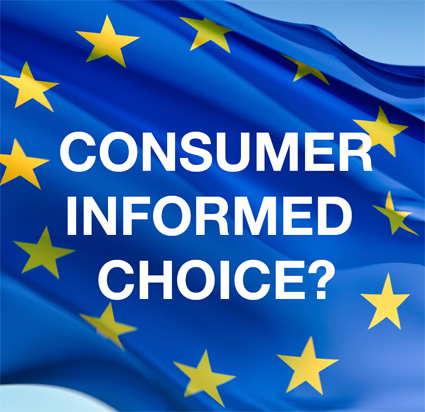Two of Europe’s largest natural product trade associations have joined forces in a lawsuit that seeks to maintain some semblance of free speech in healthcare beyond the end of 2012. We wish them well. But in the wings, something interesting is stirring in the Netherlands...
A welcome initiative
The lawsuit is being brought by the UK’s Health Food Manufacturers’ Association (HFMA) and the Netherlands’ Natuur- en Gezondheidsproducten Nederland (NPN), who are trying to block the dreaded ‘Community list’, or European Union (EU) Register, of Article 13 health claims that is mandated by the Nutrition and Health Claims Regulation (NHCR; No. 1924/2006).
Lest we forget, the EU Register will take a hefty set of jackboots to the concept of free speech in natural healthcare, by banning manufacturers of foods and food ingredients from making any health-related claims about their products unless they’ve been approved by the European Food Safety Authority (EFSA). For various reasons, EFSA has approved only 222 health claims, with claims for botanicals and probiotics still pending.
Flaws in health claims regulation exposed in public domain
The HFMA/NPN have provided a laundry list of reasons why Regulation (EU) No 432/2012, the ‘Permitted List Regulation’, is misguided and should be overturned. These range from ‘Failure to assess health maintenance effects’ to ‘Failure to recognise other expert views’, and they also refer to the crucial issue of EFSA’s use of, “Pharmaceutical style evidence to substantiate the claimed benefits for foods and food supplements”.
A new permitted list
HFMA/NPN say that, if their legal action succeeds, they’d like to see the European Commission start from scratch and produce a new ‘Community list’: “The correct approach is to produce a single permitted list (i.e. in one go rather than piecemeal) and [for] generic [i.e. Article 13] claims [to] undergo a different type of assessment to that of Article 14 and Article 13.5 claims.” The trade associations hope for a decision by the end of 2012 under an expedited legal process.
Keen NHCR-watchers will recall that Member of the European Parliament (MEP) Marian Harkin, among others, drew attention to the issue of claims assessment in the run-up to the vote on the health claims list. We strongly supported Ms Harkin at the time, and we stand just as firmly behind the HFMA/NPN legal action – although with the rider that, unless EFSA performs a root and branch overhaul of its flawed scientific assessment procedures, any new permitted list will be just as inadequate as the current one.
The legal action might never have become necessary, had Europe's trade associations publicly joined us and other interested parties in consistently lobbying for a Parliamentary veto of the proposed health claims list at the time.
Dutch courage
Meanwhile, the NPN and other industry stakeholders have been trying to find a workaround to the health claims problem with the Dutch government. Apart from the small number of approved claims, the fact that companies are supposed to stick to the EFSA-approved wording of those claims presents another headache. The Dutch government has proven itself more forward-looking than most by agreeing with industry stakeholders’ proposal to allow companies to ‘interpret’ the basic claims wording. Companies will therefore gain greater flexibility in the wording permitted for their products’ health claims, under the certain knowledge that their national government approves.
Here’s an example. If an EFSA-approved health claim says, “Substance X helps to maintain normal brain/psychological function”, the interpretation allowed by the Dutch government would allow manufacturers to deduce what the claim implies, and to make health claims based on that deduction, supported by the underlying EFSA opinion. So in this case, allowable health claims might be, “Substance X supports memory” or “Substance X helps to maintain concentration” – clearly a vast improvement on the original situation. Ironically enough, this more lenient approach also will make the claims more accurate, and less potentially misleading to consumers.
It’s not over yet!
The prospects of a successful legal challenge as well as an intelligent interpretation by a government, albeit one well recognised for its progressiveness, offer a glimmer of hope that the full horror of the EU Register of health claims will escape the 500 million or so citizens of Europe.
We’re crossing our fingers that the lawsuit succeeds, and that other EU Member States will adopt the Dutch government’s innovative approach.
Past stories on EU health claims
ANH FEATURE: From 44,000 to 224 — the Great EU Health Claims Cull
Politicians, trade associations, lobbyists – and the health claims list
Stop press: prunes DO have a laxative effect, according to EFSA!
ANH-Intl Short Story: a world without health information
Coping with the EU’s Community Register of health claims








Comments
your voice counts
18 November 2013 at 4:44 pm
I sincerely hope that this lawsuit will succeed, health is very important.
Your voice counts
We welcome your comments and are very interested in your point of view, but we ask that you keep them relevant to the article, that they be civil and without commercial links. All comments are moderated prior to being published. We reserve the right to edit or not publish comments that we consider abusive or offensive.
There is extra content here from a third party provider. You will be unable to see this content unless you agree to allow Content Cookies. Cookie Preferences